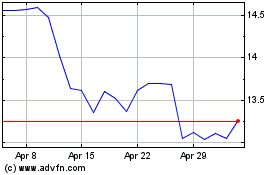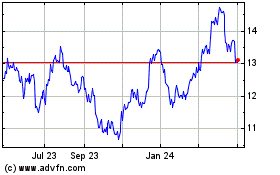BASF to Reduce Investment Spending After Swinging to a Net Loss -- Update
October 31 2023 - 5:25AM
Dow Jones News
By Pierre Bertrand
BASF said that it will reduce its spending in the years to come
after lower prices and volumes swung the company to a third-quarter
net loss.
The German chemical company said Tuesday that it plans to reduce
its capex by 4 billion euros ($4.25 billion) for the five-year
period to 2027, due to macroeconomic conditions.
The reduction means BASF is planning to spend EUR24.8 billion
from 2023 to 2027, compared with EUR28.8 billion previously.
"We are reducing the overall investments for BASF Group, but we
remain fully committed to our growth projects and our
transformation towards climate neutrality. Moreover, we are not
simply postponing investments. We are reducing the number of
projects and will implement alternative measures that involve lower
capex," Chief Executive Martin Brudermueller said in a
statement.
He added that BASF has trimmed its spending by EUR1 billion to
EUR5.3 billion this year.
BASF posted a EUR249 million net loss compared with EUR909
million in profit in the prior year, on revenue that fell 28% to
EUR15.73 billion.
The company's earnings before interest and taxes before special
items fell 57% to EUR575 million.
The result compares with analysts' expectations of EUR282
million in net profit and EUR17.58 billion in sales, according to a
company-compiled consensus.
BASF said that prices fell particularly in its Materials,
Chemicals and Surface Technologies divisions while they increased
at its Agricultural Solutions unit.
Sales volumes also fell across all customer end-markets with the
exception of the automotive sector, BASF said.
Chemical production slowed considerably in Europe due to lower
demand as a result of high inflation, increased interest rates and
a rise in natural gas prices. There was also a slowdown in consumer
spending, BASF said, which added that chemical production on the
continent declined by 6.6% on year while energy prices were around
40% higher than their average between 2019 and 2021.
The earnings decline also reflected the third-quarter net loss
reported by oil and gas company Wintershall Dea, in which BASF has
a 72.7% stake.
BASF is still working on various options regarding its goal of
selling its stake in the company, Chief Financial Officer, Dirk
Elvermann, said in a post-earnings statement.
The DAX-listed company said it expects to achieve more than
EUR600 million in non-production cost savings by the end of next
year, and more than EUR700 million by the end of 2026.
Global chemical production is expected to further stabilize in
the fourth quarter, the company said. But it warned that the
macroeconomic outlook remains uncertain.
"If chemical production does not further stabilize, there are
risks from a further decline in volumes and a sharper-than-expected
price reduction," Brudermueller said.
He added that BASF doesn't expect an easy start to 2024.
BASF backed its 2023 guidance although said it expected its
sales and EBIT before special items at the lower end of their
respective ranges.
BASF backed its 2023 sales forecast of between EUR73 billion and
EUR76 billion and its pre-special-item EBIT forecast between EUR4
billion and EUR4.4 billion.
Write to Pierre Bertrand at pierre.bertrand@wsj.com
(END) Dow Jones Newswires
October 31, 2023 05:10 ET (09:10 GMT)
Copyright (c) 2023 Dow Jones & Company, Inc.
BASF (QX) (USOTC:BASFY)
Historical Stock Chart
From Apr 2024 to May 2024

BASF (QX) (USOTC:BASFY)
Historical Stock Chart
From May 2023 to May 2024
